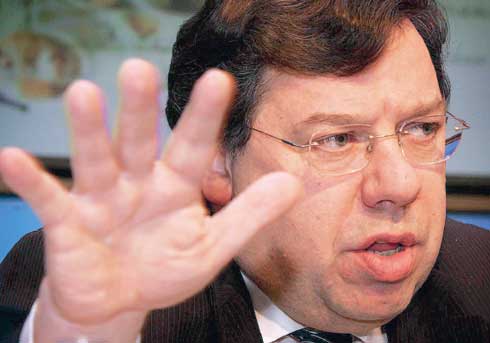 Irish banks are likely to be presented with €2 billion bill for the Government’s bank guarantee announced earlier this week. Irish Central Bank governor John Hurley said the rescue package should not come at a cost to the taxpayer and the banks should pay a substantial fee in return for state coverage. The Department of Finance said it would seek an annual charge of 0.2 percent of the €500 billion banking market which would amount to two billion over two years. The move represents an extraordinary transfer of power from Ireland’s top bankers to the previously pliant administration in the wake of the worldwide financial crisis.
Irish banks are likely to be presented with €2 billion bill for the Government’s bank guarantee announced earlier this week. Irish Central Bank governor John Hurley said the rescue package should not come at a cost to the taxpayer and the banks should pay a substantial fee in return for state coverage. The Department of Finance said it would seek an annual charge of 0.2 percent of the €500 billion banking market which would amount to two billion over two years. The move represents an extraordinary transfer of power from Ireland’s top bankers to the previously pliant administration in the wake of the worldwide financial crisis. The open Irish economy was always extremely vulnerable to the credit crunch. The 15 year boom was based on easy and flowing access to large amounts of money. But since 2007 the construction industry has been in crisis and consumer spending has waned. It was also only a matter of time before the toxicity of the US money market spread across the Atlantic. Matters moved swiftly in the last two weeks with a series of interlocking events. As the US banking house of cards teetered on the brink of collapse, Ireland announced its second successive quarter of negative growth. The country was officially in recession. Figures from the Irish Central Statistics Office showed the economy had contracted by 2.3 percent in the last 6 months and the exchequer faced a €7 billion shortfall.
Then on Monday last week, Irish banks suffered one of their largest ever one day falls in the wake of US legislators’ failure to agree the original rescue package. The Wall St carnage rippled quickly across the Atlantic and threatened tsunami on Irish banks. The combination of a freefalling share market and the lack of access to international funds had the potential to produce a run on Irish banks. Alarmed bankers privately told the Government that maturity dates on loans needed to fund their business were rapidly approaching and the cupboard was bare. The government moved quickly and by Wednesday had announced emergency legislation to protect the integrity of the local banking system. The extraordinary package guaranteed €400 billion of “deposits, loans and obligations” at six Irish financial institutions, a value some three times the size of Ireland’s total GDP.
The risky manoeuvre had immediate success in reversing the share losses of the Irish banks. Crucially it also ended speculation of a run on the banks, ending the possibility of it becoming a self-fulfilling prophecy. In order to quell speculation the Government was underwriting selfish banking practices, the bill allowed the Government to recoup any financial support provided and also set a higher charge on the state guarantee on financial institutions who engage in risky lending practices.
International reaction to the bill was mixed. The Wall Street Journal hailed the move as one of the most ambitious measures taken by a government since the credit crunch began. The European Commission was dismayed at Ireland’s independent move ahead of the weekend’s continent wide crisis talks in Paris. The possibility of a run on foreign owned banks also remained real as they were deemed out of scope of the rescue package. The Ulster Bank which relies on the Republic for a substantial portion of its business was particularly aggrieved to be left out of the arrangements. They have applied for coverage under the guarantee along with three other internationally owned banks.
The possibility Irish owned banks may not have learnt the sobering new economic lesson was underscored by the revelation Michael Fingleton Jnr (whose father Michael Snr is Irish Nationwide’s CEO) used the bailout to drum up business in the UK. Fingleton sent out an email last week stating the building society was now “the safest place to deposit money in Europe”. While there is now considerable truth in that assertion thanks to the Government’s intervention, this was not the message Taoiseach Brian Cowen wanted to trumpet with the rescue plan. Cowen reacted quickly to describe the email as unacceptable behaviour. “The whole purpose of providing the State guarantee was not to allow for predatory practice,” he said. But predatory practice is exactly what financial institutions thrive on and Cowen will have to tread carefully to ensure that the taxpayer guarantee doesn’t underwrite more of the behaviour the plan was designed to cure. Combined with a recession likely to last until the end of 2009, the results would be toxic both at the bank and the ballot box.
No comments:
Post a Comment